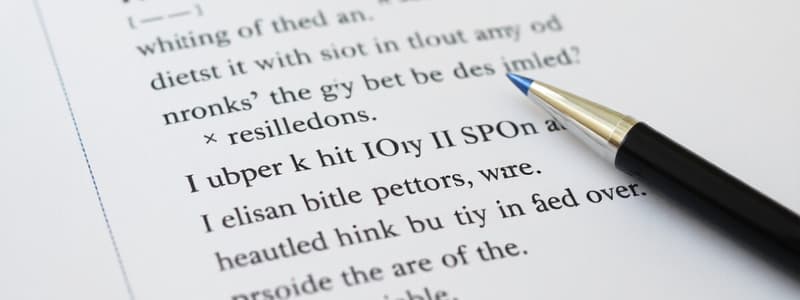Podcast
Questions and Answers
Which type of sentence makes a statement?
Which type of sentence makes a statement?
- Interrogative
- Imperative
- Declarative (correct)
- Exclamatory
Which type of sentence asks a question?
Which type of sentence asks a question?
- Exclamatory
- Declarative
- Interrogative (correct)
- Imperative
Which type of sentence gives a command or makes a request?
Which type of sentence gives a command or makes a request?
- Imperative (correct)
- Declarative
- Interrogative
- Exclamatory
Which type of sentence expresses strong emotion?
Which type of sentence expresses strong emotion?
What punctuation mark ends a declarative sentence?
What punctuation mark ends a declarative sentence?
What punctuation mark ends an interrogative sentence?
What punctuation mark ends an interrogative sentence?
Which sentence type is MOSTLY used to state facts in news reporting?
Which sentence type is MOSTLY used to state facts in news reporting?
In news reporting, where might you find an imperative sentence?
In news reporting, where might you find an imperative sentence?
Which of the following is a declarative sentence?
Which of the following is a declarative sentence?
Which of the following is an interrogative sentence?
Which of the following is an interrogative sentence?
Which of the following is an exclamatory sentence?
Which of the following is an exclamatory sentence?
Which sentence type adds directness or urgency when used in quotes?
Which sentence type adds directness or urgency when used in quotes?
What does overusing exclamatory sentences risk doing to the news?
What does overusing exclamatory sentences risk doing to the news?
What kind of information do declarative sentences provide?
What kind of information do declarative sentences provide?
Which question word is used to start an interrogative sentence?
Which question word is used to start an interrogative sentence?
In a news report, what is the purpose of declarative sentences?
In a news report, what is the purpose of declarative sentences?
Which is an example of a correctly written declarative sentence?
Which is an example of a correctly written declarative sentence?
Why is it bad to overuse interrogative sentences in news reporting?
Why is it bad to overuse interrogative sentences in news reporting?
Which sentence is correctly identified by its type?
Which sentence is correctly identified by its type?
Flashcards
Declarative Sentences
Declarative Sentences
Make a statement and end with a period. They convey facts or information.
Interrogative Sentences
Interrogative Sentences
Ask a question and end with a question mark. They seek information.
Imperative Sentences
Imperative Sentences
Give a command or make a request. They often start with a verb.
Exclamatory Sentences
Exclamatory Sentences
Signup and view all the flashcards
Declarative Sentence Structure
Declarative Sentence Structure
Signup and view all the flashcards
Interrogative Sentence Structure
Interrogative Sentence Structure
Signup and view all the flashcards
Imperative Sentence Structure
Imperative Sentence Structure
Signup and view all the flashcards
Exclamatory Sentence Structure
Exclamatory Sentence Structure
Signup and view all the flashcards
Declarative Sentences in News
Declarative Sentences in News
Signup and view all the flashcards
Interrogative Sentences in News
Interrogative Sentences in News
Signup and view all the flashcards
Imperative Sentences in News
Imperative Sentences in News
Signup and view all the flashcards
Exclamatory Sentences in News
Exclamatory Sentences in News
Signup and view all the flashcards
Overusing Interrogative Sentences
Overusing Interrogative Sentences
Signup and view all the flashcards
Overusing Exclamatory Sentences
Overusing Exclamatory Sentences
Signup and view all the flashcards
Overusing Imperative Sentences
Overusing Imperative Sentences
Signup and view all the flashcards
Enhancing Sentence Clarity
Enhancing Sentence Clarity
Signup and view all the flashcards
Sentence Structure in Quotes
Sentence Structure in Quotes
Signup and view all the flashcards
Key to Effective News Writing
Key to Effective News Writing
Signup and view all the flashcards
Study Notes
- News reporting in Grade 5 involves understanding and using different types of sentences to make writing clear, engaging, and informative.
- There are four main types of sentences: declarative, interrogative, imperative, and exclamatory.
Declarative Sentences
- Declarative sentences make a statement and end with a period.
- They convey facts or information.
- Example: "The school held a fundraising event."
- They form the backbone of news reporting because they provide the essential details of an event or story.
- Structure: Subject + Verb + (Optional Object/Complement).
- Example: "The team won the championship game." (Subject: team, Verb: won)
- Used to present facts, details, and background information clearly and directly.
- Example: "The city council approved the new park project."
- They aim to inform the reader in a straightforward manner.
- Example: "The weather forecast predicts rain for tomorrow."
Interrogative Sentences
- Interrogative sentences ask a question and end with a question mark.
- They seek information and can be used in interviews or to raise questions in the reader's mind.
- Example: "What did the principal say about the new policy?"
- Used to gather quotes or statements from people involved in the news story.
- Example: Asking a witness: "What did you see at the scene?"
- Can be used to pose questions to the reader, prompting thought.
- Example: "Could this new discovery change everything?"
- Structure: Question Word (e.g., Who, What, Where, When, Why, How) + Auxiliary Verb + Subject + Main Verb?
- Example: "Why did the school close early?" (Question Word: Why, Auxiliary Verb: did)
- Help to build the narrative by including different perspectives.
- Example: "How will this affect local residents?"
Imperative Sentences
- Imperative sentences give a command or make a request.
- They usually start with a verb and often omit the subject (which is understood to be "you").
- Example: "Report the facts accurately."
- In news reporting, they are less common but can appear in direct quotes or instructions.
- Example: "The officer said, 'Do not cross the line.'"
- Structure: Verb + (Optional Object/Complement).
- Example: "Consider the evidence." (Verb: Consider)
- Add an element of directness or urgency when used in quotes.
- Example: "The coach urged, 'Give it your all!'"
- Can be used to instruct the reader in certain contexts, though this is rare in typical news articles.
- Example: "Note the details carefully."
Exclamatory Sentences
- Exclamatory sentences express strong emotion and end with an exclamation point.
- They can add emphasis or excitement to a news story, but should be used sparingly to maintain objectivity.
- Example: "The team won the game!"
- Used to convey surprise, excitement, or strong feelings.
- Example: "What an incredible performance!"
- Structure: Often starts with "What" or "How" + Subject + Verb.
- Example: "How exciting the news is!"
- Can make the reporting more engaging when used appropriately.
- Example: "The crowd roared with excitement!"
- Should be used carefully to avoid sensationalizing the news.
- Example: Instead of "The disaster was absolutely devastating!" use "The disaster caused significant damage."
Combining Sentence Types
- Effective news reporting uses a mix of sentence types to keep the writing interesting and informative.
- Declarative sentences provide the facts, while interrogative sentences gather information and engage the reader.
- Imperative and exclamatory sentences can add emphasis or emotion when used judiciously.
- Varying sentence types helps to maintain reader interest and comprehension.
- A news article might start with a declarative sentence to state the main fact, followed by interrogative sentences to explore different angles of the story.
- Quotes often include imperative or exclamatory sentences, adding authenticity and emotion.
Examples in News Reporting
- Declarative: "The mayor announced a new initiative to improve local schools."
- Interrogative: "How will this initiative affect student performance?"
- Imperative (in a quote): "The mayor stated, 'Support our schools!'"
- Exclamatory: (Used sparingly) "What a victory for the community!"
Tips for Grade 5 Students
- Practice identifying and writing each type of sentence.
- Pay attention to how different sentence types are used in news articles.
- Experiment with combining sentence types to make your writing more dynamic.
- Remember to use declarative sentences as the foundation of your news reporting.
- Use interrogative sentences to gather information and engage your reader.
- Use imperative and exclamatory sentences sparingly to add emphasis or emotion.
Avoiding Overuse
- Overusing exclamatory sentences can make the news sound sensationalized or biased.
- Overusing interrogative sentences can make the article seem unsure or speculative.
- Too many imperative sentences can make the writing sound bossy or aggressive.
- Strive for a balance, ensuring that declarative sentences form the core of your reporting.
Enhancing Clarity
- Use simple, clear language in your sentences.
- Avoid overly complex sentence structures that may confuse readers.
- Focus on conveying the essential information directly and concisely.
- Break up long sentences into shorter ones for improved readability.
- Ensure that each sentence serves a clear purpose in the overall narrative.
Sentence Structure in Quotes
- When quoting someone, pay attention to their sentence structure, including any imperative or exclamatory sentences they use.
- Direct quotes add authenticity and can convey emotion more effectively than paraphrasing.
- Ensure that the quoted sentences are properly attributed to the speaker.
- Use quotation marks to clearly indicate the beginning and end of the quoted material.
Conclusion
- Mastering the use of different types of sentences is a crucial skill for news reporting in Grade 5.
- By understanding how to use declarative, interrogative, imperative, and exclamatory sentences effectively, students can write clear, engaging, and informative news articles.
- Practice and awareness are key to developing this skill and becoming a successful young journalist.
Studying That Suits You
Use AI to generate personalized quizzes and flashcards to suit your learning preferences.




